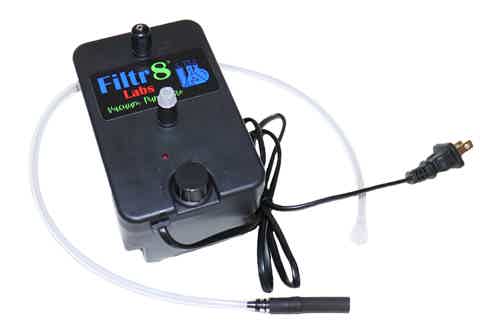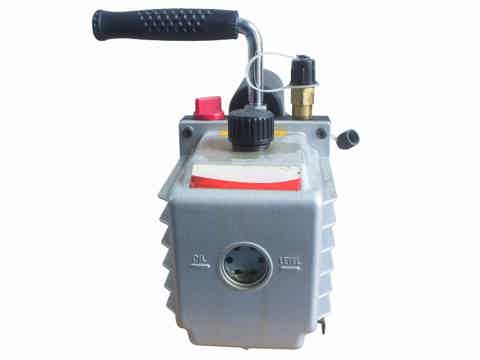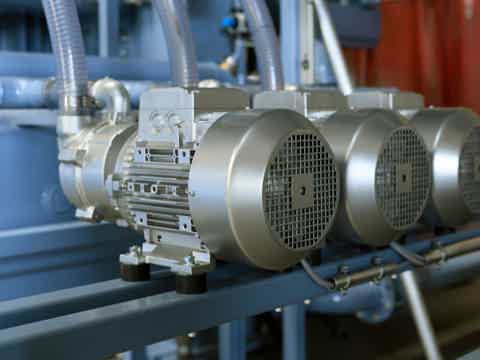Lab Vacuum Pump Types
Their Pros and Cons
In laboratory settings, vacuum pumps are essential for a wide range of applications, including vacuum filtration, distillation, and sample preparation. There are several types of laboratory vacuum pumps available, each with its own unique features and advantages.
Lab Vacuum Pump Types
Their Pros and Cons
In laboratory settings, vacuum pumps are essential for a wide range of applications, including vacuum filtration, distillation, and sample preparation. There are several types of lab vacuum pumps available, each with its own unique features and advantages.
In laboratory settings, vacuum pumps are essential for a wide range of applications, including vacuum filtration, distillation, and sample preparation.
There are several types of laboratory vacuum pumps available, each with its own unique features and advantages.
Common Types of Vacuum Pumps
Diaphragm Pumps
Diaphragm pumps are a popular choice for many applications due to their low maintenance requirements and oil-free operation. They use a flexible diaphragm to create suction, making them ideal for use with corrosive or volatile chemicals. Diaphragm pumps are also low noise and vibration, making them suitable for use in sensitive laboratory environments.

Diaphragm Vacuum Pump
Rotary Vane Pumps
Rotary vane pumps are a reliable and efficient option for many vacuum applications. They use vanes that rotate within a chamber to create suction and are capable of achieving a high vacuum level. Rotary vane pumps require oil for lubrication, and therefore are not suitable for use with many types of chemicals. These pump generally are very noisy, so they may not

Rotary Vane Vacuum Pump
Scroll Pumps
Scroll pumps are a relatively new type of vacuum pump that offer several advantages over traditional pumps. They are oil-free, making them suitable for use with corrosive or sensitive chemicals. Scroll pumps are also quiet, energy-efficient, and require minimal maintenance. However, they are not suitable for high vacuum applications.
Turbo Pumps
Turbo pumps are highly efficient and capable of achieving high vacuum levels. They use a rapidly spinning rotor to create suction, making them an excellent choice for demanding applications that require high vacuum levels. However, turbo pumps require high voltage power supplies, specialized electronics, and vacuum controllers which can make them too expensive and complex to use for a small operation.

Centralized Vacuum Pump Station
Selecting the right vacuum pump for your application depends on several factors, including the chemical solutions used, the desired vacuum level, and the required maintenance. By understanding the ad vacuum pump, you can choose the best pump for your specific lab application. With the right vacuum pump, you can optimize your processes, increase efficiency, and achieve accurate and reliable results.
Common Types of Vacuum Pumps
Diaphragm Pumps
Diaphragm pumps are a popular choice for many applications due to their low maintenance requirements and oil-free operation. They use a flexible diaphragm to create suction, making them ideal for use with corrosive or volatile chemicals. Diaphragm pumps are also low noise and vibration, making them suitable for use in sensitive laboratory environments.

Diaphragm Vacuum Pump
Rotary Vane Pumps
Rotary vane pumps are a reliable and efficient option for many vacuum applications. They use vanes that rotate within a chamber to create suction and are capable of achieving a high vacuum level. Rotary vane pumps require oil for lubrication, and therefore are not suitable for use with many types of chemicals. These pump generally are very noisy, so they may not be the best choice for a benchtop.

Rotary Vane Vacuum Pump
Scroll Pumps
Scroll pumps are a relatively new type of vacuum pump that offer several advantages over traditional pumps. They are oil-free, making them suitable for use with corrosive or sensitive chemicals. Scroll pumps are also quiet, energy-efficient, and require minimal maintenance. However, they are not suitable for high vacuum applications.
Turbo Pumps
Turbo pumps are highly efficient and capable of achieving high vacuum levels. They use a rapidly spinning rotor to create suction, making them an excellent choice for demanding applications that require high vacuum levels. However, turbo pumps require high voltage power supplies, specialized electronics, and vacuum controllers which can make them too expensive and complex to use for a small operation.

Centralized Vacuum Pump Station
Selecting the right vacuum pump for your application depends on several factors, including the chemical solutions used, the desired vacuum level, and the required maintenance. By understanding the advantages and limitations of each type of vacuum pump, you can choose the best pump for your specific application. With the right vacuum pump, you can optimize your processes, increase efficiency, and achieve accurate and reliable results.
Common Types of Vacuum Pumps
Diaphragm Pumps
Diaphragm pumps are a popular choice for many applications due to their low maintenance requirements and oil-free operation. They use a flexible diaphragm to create suction, making them ideal for use with corrosive or volatile chemicals. Diaphragm pumps are also low noise and vibration, making them suitable for use in sensitive laboratory environments.

Diaphragm Vacuum Pump
Rotary Vane Pumps
Rotary vane pumps are a reliable and efficient option for many vacuum applications. They use vanes that rotate within a chamber to create suction and are capable of achieving a high vacuum level. Rotary vane pumps require oil for lubrication, and therefore are not suitable for use with many types of chemicals. These pump generally are very noisy, so they may not

Rotary Vane Vacuum Pump
Scroll Pumps
Scroll pumps are a relatively new type of vacuum pump that offer several advantages over traditional pumps. They are oil-free, making them suitable for use with corrosive or sensitive chemicals. Scroll pumps are also quiet, energy-efficient, and require minimal maintenance. However, they are not suitable for high vacuum applications.
Turbo Pumps
Turbo pumps are highly efficient and capable of achieving high vacuum levels. They use a rapidly spinning rotor to create suction, making them an excellent choice for demanding applications that require high vacuum levels. However, turbo pumps require high voltage power supplies, specialized electronics, and vacuum controllers which can make them too expensive and complex to use for a small operation.

Centralized Vacuum Pump Station
Selecting the right vacuum pump for your application depends on several factors, including the chemical solutions used, the desired vacuum level, and the required maintenance. By understanding the advantages and limitations of each type of vacuum pump, you can choose the best pump for your specific application. With the right vacuum pump, you can optimize your processes, increase efficiency, and achieve accurate and reliable results.

What Type of Vacuum Pump is Best for the Lab?
When it comes to laboratory applications, choosing the right vacuum pump is crucial to ensure accurate and reliable results. Here are some factors to consider when selecting a vacuum pump for your laboratory:
1. Vacuum level requirements: Different laboratory applications require different vacuum levels. For instance, distillation and filtration may need a low vacuum level, while freeze-drying and evaporation may require high vacuum levels. Therefore, it is important to choose a vacuum pump that can meet the required vacuum level for your application.
2. Chemical compatibility: The vacuum pump should be made of materials that are resistant to the chemicals used in the laboratory. Chemicals can corrode the pump and reduce its efficiency, leading to inaccurate results or failure.
3. Noise level: Some laboratory applications such as microscopy and spectroscopy require a low noise level. Therefore, choose a vacuum pump that produces minimal noise or has a noise reduction system.
4. Maintenance: The vacuum pump should be easy to maintain, as regular maintenance ensures the longevity and efficiency of the pump. Consider pumps that have easily replaceable parts or require minimal maintenance.

What Type of Vacuum Pump is Best for the Lab?
When it comes to laboratory applications, choosing the right vacuum pump is crucial to ensure accurate and reliable results. Here are some factors to consider when selecting a vacuum pump for your laboratory:
1. Vacuum level requirements: Different laboratory applications require different vacuum levels. For instance, distillation and filtration may need a low vacuum level, while freeze-drying and evaporation may require high vacuum levels. Therefore, it is important to choose a vacuum pump that can meet the required vacuum level for your application.
2. Chemical compatibility: The vacuum pump should be made of materials that are resistant to the chemicals used in the laboratory. Chemicals can corrode the pump and reduce its efficiency, leading to inaccurate results or failure.
3. Noise level: Some laboratory applications such as microscopy and spectroscopy require a low noise level. Therefore, choose a vacuum pump that produces minimal noise or has a noise reduction system.
4. Maintenance: The vacuum pump should be easy to maintain, as regular maintenance ensures the longevity and efficiency of the pump. Consider pumps that have easily replaceable parts or require minimal maintenance.
Choosing the right vacuum pump for a laboratory application requires careful consideration of factors such as vacuum level requirements, chemical compatibility, noise level, and maintenance. By selecting a vacuum pump that meets these criteria, you can ensure that your experiments and processes run smoothly and yield accurate and reliable results. In particular, diaphragm vacuum pumps are an excellent option for laboratory applications due to their oil-free design, chemical resistance, low noise level, and easy maintenance. With the right vacuum pump in your lab, you can enhance your research and achieve your scientific goals with confidence.
What is the Typical Cost of a Lab Vacuum Pump?
When it comes to laboratory equipment, a vacuum pump is an essential tool for many scientific experiments and processes. The cost of a vacuum pump for your lab can vary depending on a variety of factors.
First and foremost, the type of vacuum pump required for a specific laboratory application will have a significant impact on the cost. There are several types of vacuum pumps available, including rotary vane pumps, diaphragm pumps, and scroll pumps. Each type has its own advantages and disadvantages, which will affect the price.
Another factor that can affect the cost of a laboratory vacuum pump is the level of vacuum required. Different applications will require different levels of vacuum, and pumps that can achieve higher levels of vacuum will generally be more expensive.
Additionally, the brand and quality of the vacuum pump will also impact the cost. High-quality pumps from reputable brands may be more expensive, but they also tend to be more reliable and long-lasting.
Taking all of these factors into account, the typical cost of a lab pump can range from under a hundred dollars to several thousand dollars.

What is the Typical Cost of a Lab Vacuum Pump?
When it comes to laboratory equipment, a vacuum pump is an essential tool for many scientific experiments and processes. The cost of a laboratory vacuum pump can vary depending on a variety of factors.
First and foremost, the type of vacuum pump required for a specific laboratory application will have a significant impact on the cost. There are several types of vacuum pumps available, including rotary vane pumps, diaphragm pumps, and scroll pumps. Each type has its own advantages and disadvantages, which will affect the price.
Another factor that can affect the cost of a lab vacuum pump is the level of vacuum required. Different applications will require different levels of vacuum, and pumps that can achieve higher levels of vacuum will generally be more expensive.
Additionally, the brand and quality of the vacuum pump will also impact the cost. High-quality pumps from reputable brands may be more expensive, but they also tend to be more reliable and long-lasting.
Taking all of these factors into account, the typical cost of a lab vacuum pump can range from under a hundred dollars to several thousand dollars.

Ultimately, the cost of a vacuum pump will depend on the specific needs and requirements of the lab. It is important to carefully consider the various options and choose a pump that will provide the necessary level of vacuum for the intended application, while also fitting within the budget constraints of the lab. By investing in a high-quality vacuum pump that meets your specific needs, you can ensure that your experiments and processes run smoothly and yield accurate and reliable results.
